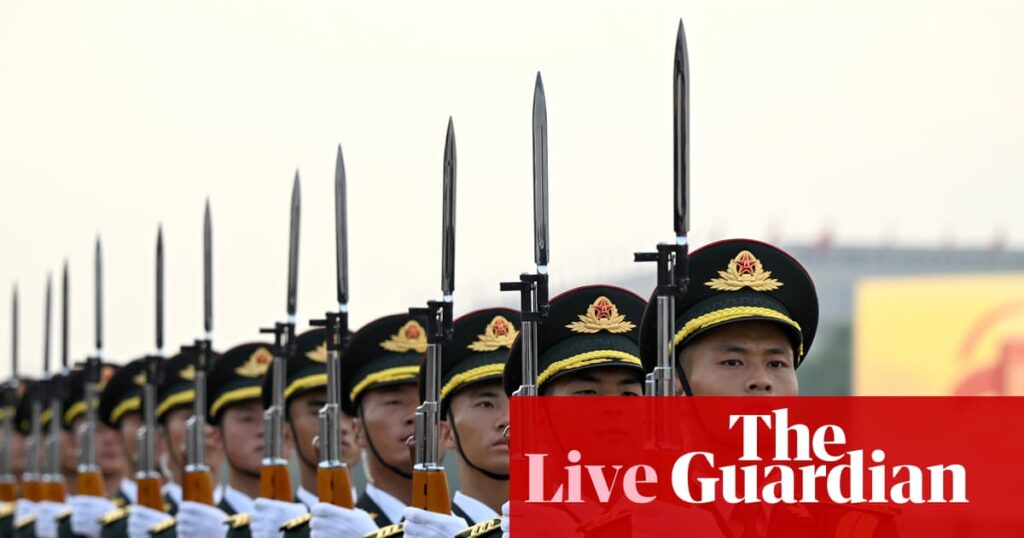
Former Victorian Premier Daniel Andrews and ex-Foreign Affairs Minister Bob Carr are facing intense criticism for attending a military parade in Beijing, marking the 80th anniversary of the end of World War II. The event, attended by Russian President Vladimir Putin and North Korean leader Kim Jong-un, has been labeled a “parade for dictators” by critics in Australia. Notably absent from the event is Australia’s ambassador to China, Scott Dewar.
The decision by Andrews and Carr to attend the parade has drawn sharp rebuke from political figures across Australia. Shadow Home Affairs Minister Andrew Hastie was particularly vocal, stating, “This is a parade for dictators. It’s a celebration of the Chinese Communist Party… I look forward to seeing them clap like seals as the missiles roll by.” Opposition Leader Sussan Ley echoed these sentiments, questioning the message their attendance sends to the world.
Political Reactions and Implications
The criticism of Andrews and Carr’s attendance highlights ongoing tensions within Australian politics regarding international relations, particularly with China. The event’s attendance by controversial figures like Putin and Kim Jong-un adds a layer of complexity to the diplomatic landscape. Ley’s comments on the Today show emphasized the need for Andrews and Carr to justify their presence at an event also attended by such leaders.
This development follows a broader context of scrutiny over Australia’s diplomatic engagements, especially in light of geopolitical tensions involving China. The absence of Australia’s ambassador underscores the delicate balance Australia maintains in its foreign policy, particularly concerning China.
Controversial Legislation and Political Maneuvering
In a separate but equally contentious political issue, Attorney-General Michelle Rowland introduced a bill to impose charges on Freedom of Information (FoI) requests. Rowland argues that the system is overwhelmed by “vexatious, abusive, and frivolous” requests, consuming over a million hours of public servants’ time in 2023-24 alone. The bill aims to implement recommendations from a 2013 review to enhance system efficiency.
While most states and territories already charge fees for FoI requests, the federal system’s proposed fees have sparked debate. The Greens and Coalition have criticized the bill, though Independent MP Andrew Wilkie expressed a willingness to compromise, acknowledging the need for reform but opposing the introduction of fees.
Expert Opinions and Analysis
Experts argue that the introduction of fees could deter legitimate requests and reduce government transparency. Critics suggest that the fees could disproportionately affect individuals seeking personal information, despite government assurances of exemptions in such cases. The debate underscores the tension between administrative efficiency and public access to information.
Legal and Ethical Challenges in Australian Politics
Meanwhile, the unlawful termination case of journalist Antoinette Lattouf against the ABC returned to court for a pecuniary hearing. The federal court previously found that the ABC breached the Fair Work Act when it terminated Lattouf due to her political opinions. The case highlights ongoing legal and ethical challenges faced by media organizations in balancing editorial independence with external pressures.
Justice Darryl Rangiah’s judgment underscored the influence of external lobbying on media decisions, a concern echoed by media freedom advocates. The case’s outcome could set a precedent for future disputes involving political expression and employment rights.
Looking Forward: Political and Social Dynamics
The controversies surrounding Andrews and Carr’s attendance at the Beijing parade, alongside domestic legislative debates, illustrate the complex interplay of international diplomacy and domestic politics in Australia. As the nation navigates these challenges, the implications for Australia’s international standing and internal political dynamics remain significant.
As these stories unfold, the Australian public and political leaders alike are called to reflect on the values and priorities that guide the nation’s domestic and foreign policy decisions. The outcomes of these debates and legal challenges will likely influence Australia’s political landscape for years to come.







